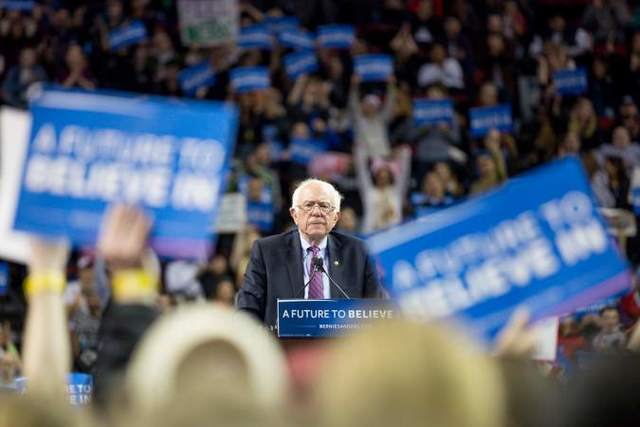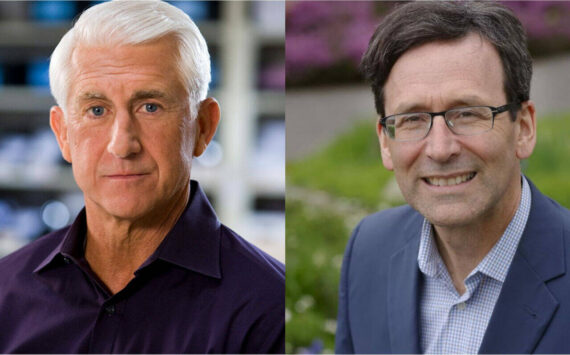Socialist City Councilmember Kshama Sawant wants socialist Bernie Sanders to run for president as an independent in the November general election.
Thos assumes, of course, that Sanders won’t win the Democratic nomination. And at this point, he almost certainly won’t, according to the eggheads at FiveThirtyEight.com. “[T]he unsexy truth is that, barring some catastrophic news event, Sanders will not win the Democratic nomination for president in 2016,” reporter Milo Beckman wrote for the website last week, shortly after the Sanders campaign announced it would be laying off “hundreds” of staffers and concentrating all its efforts into winning the California primary in June.
Beckman looked at every presidential nomination race since 1972, when modern election rules were instated. Even with a couple of methodological assumptions that skew the outcome in Sanders’ favor, Beckman’s analysis found no precedent of a candidate coming back to win the Democratic nomination this late in the election from this far behind.
Hence Sawant’s exhortation to Senator from Vermont: Run against Clinton in the general election. “People are angry at corporate politics and the establishment of both parties, and they’re looking for something to fight back against the status quo,” she says. “We have to fight the Right, but the best way and the only to do that is to present an alternative to the establishment.”
Sawant’s plea may sound appealing to the hordes of Sanders supporters who find Clinton’s politics unacceptable, and Sawant’s own story could lend some credence to a third-party run. Three years ago, there was no precedent for a revolutionary socialist beating a mainstream incumbent for a city-wide Seattle Council seat. Yet that’s exactly what Sawant did in a gravity-defying comeback against middle-of-the-road Democrat Richard Conlin.
Sawant thinks Sanders can pull off the same miracle on a national scale, perhaps by capturing some of Trump’s anti-establishment vote. “If you look at the terrain that we ran in in Seattle,” she said in an online video posted last week, “it is fundamentally the same as the conditions that Bernie faces, with a very hostile political establishment.”
Yet there’s one huge difference between the 2013 Seattle Council election and the 2016 U.S. presidential election: Republicans. While R’s are all but absent from Seattle politics, an independent Sanders run could split the left vote nationally and deliver the shitshow that is the current GOP to the White House.
That would suck, says Washington state senator and U.S. congressional candidate Pramila Jayapal. “I think there’s a huge difference between the platforms and the positions of Hillary Clinton and Donald Trump,” she says, pointing to immigration and foreign policy as two examples.
Where Sawant is rallying Sanders supporters to push him to run as an independent, Jayapal displays how the large and powerful Bernie movement could work within the Democratic Party rather than against it. She is one of three national congressional candidates that the Sanders campaign has urged its massive donor base to support, along with Lucy Flores in Nevada and Zephyr Teachout in New York. That urging is part of a larger shift in Sanders’ strategy from a one-year presidential election to an ongoing “political revolution.” The goal is to place grassroots progressives at every level of government, including the congressional seat Jayapal is running for. “[Sanders is] talking about utilizing the movement that’s been built around his candidacy to make sure that we continue to pull the Democratic Party to respond to the needs of working people,” she says.
Still, that doesn’t neccessarily ease Sanders supporters’ concerns about the presidential race. Sure, there are real differences between Clinton and flamboyant bigot Donald Trump. But it’s also true that Clinton’s top donors include Citigroup, JP Morgan Chase & Co., and Goldman Sachs—the very same banks she voted to bail out during the 2008 financial crisis.
So despite all the palpable differences between Clinton and Republicans, in terms of pecuniary loyalty, isn’t she still the candidate of the 1 percent? “There’s no question,” Jayapal replies cautiously, “that billionaire corporations have way too much power in the system … I guess the question is, How [do we take that on]? And if you believe that the best way to take it on is by essentially blowing up the Democratic Party and allowing Trump to win, and through that make thing so bad that we then generate a new party, that is one way of looking it.” But not her way.
“I think people who are calling on Bernie to run as an independent are making a point that the Democratic Party is not responding enough to the needs of working people, and is responding too much to the needs of big donors, corporations, big Wall Street Banks,” she says. “I don’t necessarily argue with that,” Jayapal continues. “I just think that fundamentally I don’t believe that allowing the country to sink to the level of having Donald Trump or Ted Cruz as president is helping working people. That is going to deeply hurt generations … It takes a long time to roll any of that stuff back.” And the presumption that there will be more generations to roll that stuff back may be optimistic, if either Trump or Cruz gain control of America’s nuclear arsenal.
So here’s the dilemma facing Sanders and his followers: bet everything on an independent run against both Clinton and the Republican candidate, or back the lesser evil and then try to push Clinton left through bottom-up political organizing during her presidency?
Of course, the choice isn’t so clear-cut in practice. For instance, Sanders could run as an independent to keep pushing Clinton left, then drop out at the last minute. Or they could join forces, with Clinton adopting key features of his platform and Sanders supporting her in return.
And who knows—maybe, somehow, Sanders will come from behind to clinch the nomination. Take comfort, Bernie Bros, in Donald Trump: In an election where he’s the Republican front-runner, anything is possible.








